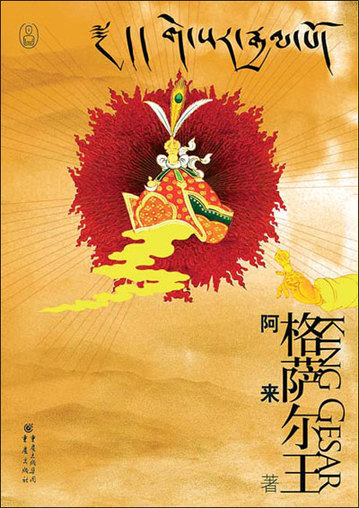A novel of epic proportions
Updated: 2011-10-28 08:06
By Liu Jun (China Daily)
|
|||||||||
|
Alai's King Gesar will be published in English in 2012, as part of the Canongate Books' Myth Series. Feng Yongbin / China Daily |
Tibetan author Alai's King Gesar provides easy access to the classic and lengthy adventures of the legendary ruler. Liu Jun reports.
Gigme wakes up to find himself in a pigsty, covered in manure, clueless as to his whereabouts.
"I don't deserve this! You shouldn't have treated me like this!" he yells, while children and suspicious villagers laugh.
 |
He has every reason to be angry. For several years, he has been journeying on foot, telling stories about King Gesar, the legendary Tibetan hero whose tales are wildly popular throughout Central Asia.
Gigme, who used to be a poor illiterate herder and is blind in one eye, is one of the few gifted ballad singers who claim they were entrusted with the mission of spreading Gesar's glory in a dream.
Yet Gigme has annoyed the King by questioning the tales. In Gigme's dream, the King thrusts an arrow through the storyteller, and shoots him out of the dream.
The epic King Gesar is one of the classics. But since it is the world's longest epic, most people have not read it.
King Gesar (2009), a novel by Tibetan author Alai, offers easy access to this literary treasure. After much anticipation, foreign readers will finally get an English version in a year's time.
Canongate Books, the British publisher that initiated the Myth Series, for which Alai was commissioned to rewrite the Tibetan epic, will publish the English version around October 2012.
"The story itself has never - as far as I am aware - been told in English to Western readers before, and this in itself makes it fascinating and an ideal addition to the Canongate Myths Series," Norah Perkins, managing editor with Canongate, says in an e-mail interview.
"Alai's myth is also a window on Tibet, a land that has long inspired the empathy and imagination of millions of people around the world."
Perkins is working with renowned American translator Howard Goldblatt to shorten the book slightly, to which Alai has agreed.
"My wife and I finished the translation of Gesar more than a year ago. We liked the novel - a bit long, perhaps, but a fine concept," Goldblatt says in an e-mail earlier this year.
Alai was the ideal candidate to rewrite King Gesar. The Tibetan author was born and grew up in the area bordering Tibet autonomous region, Sichuan and Qinghai provinces, where King Gesar is said to have lived some 1,000 years ago.
The author is not content with telling the life story of Gesar alone but carefully builds a parallel structure revolving around Gesar and the storyteller Gigme. It is particularly relevant to modern readers in offering glimpses into the hardships of the humble storytellers.
While traditional storytellers and their audiences have been intoxicated by Gesar's stories of war and love, Alai poses tough questions that force readers to think.
Like Alai himself, Gigme tries to locate places where Gesar fought or lived. But the longer he travels, the more doubtful Gigme becomes of the King's everlasting glory.
Gigme finds a salt lake where Gesar is said to have fought a prince and allowed the conquered people to make a living by gathering and selling salt from the lake.
However, salt and other daily commodities are now sent to remote places at reasonable prices. Villagers no longer need the bitter lake salt.
In an interesting twist, just as Gigme struggles to find the meaning of his mission, Gesar is also reluctant to fulfill his mission to help mankind.
Like King Arthur in Camelot, Gesar is not happy on his golden throne, surrounded by powerful generals, wise counselors and jealous beauties. Gesar realizes that he cannot get rid of greed, suspicion or inequality - demons hiding in the human heart.
In turn, the perturbed King dreams of Gigme. He is amazed to learn that the great kingdom he has created will no longer exist. Compared to the arrogant and all-knowing Gesar in heaven, this melancholy King is more humane in Gigme's (and the author's) eyes.
After freeing the ghosts from hell on a quest to save his wife and mother, Gesar is ready to return to heaven. On the way, he revisits Gigme and pulls out the invisible arrow, freeing the ballad singer from his life-long mission.
King Gesar looks like a fossil: The meaty parts - glamorous descriptions of battles, attire and witty banter - had to be sacrificed. But Alai does a good job introducing the world's longest (and still growing) epic to the reader.
"The enduring fascination of the Myths Series is that no two myths are the same - they reflect not simply their different origins but, most importantly, the individual voices of the authors who have chosen to retell them," Perkins says.
"So Alai's myth fits perfectly into the patchwork of our series - it is both like and unlike the other books, distinct and complementary."












